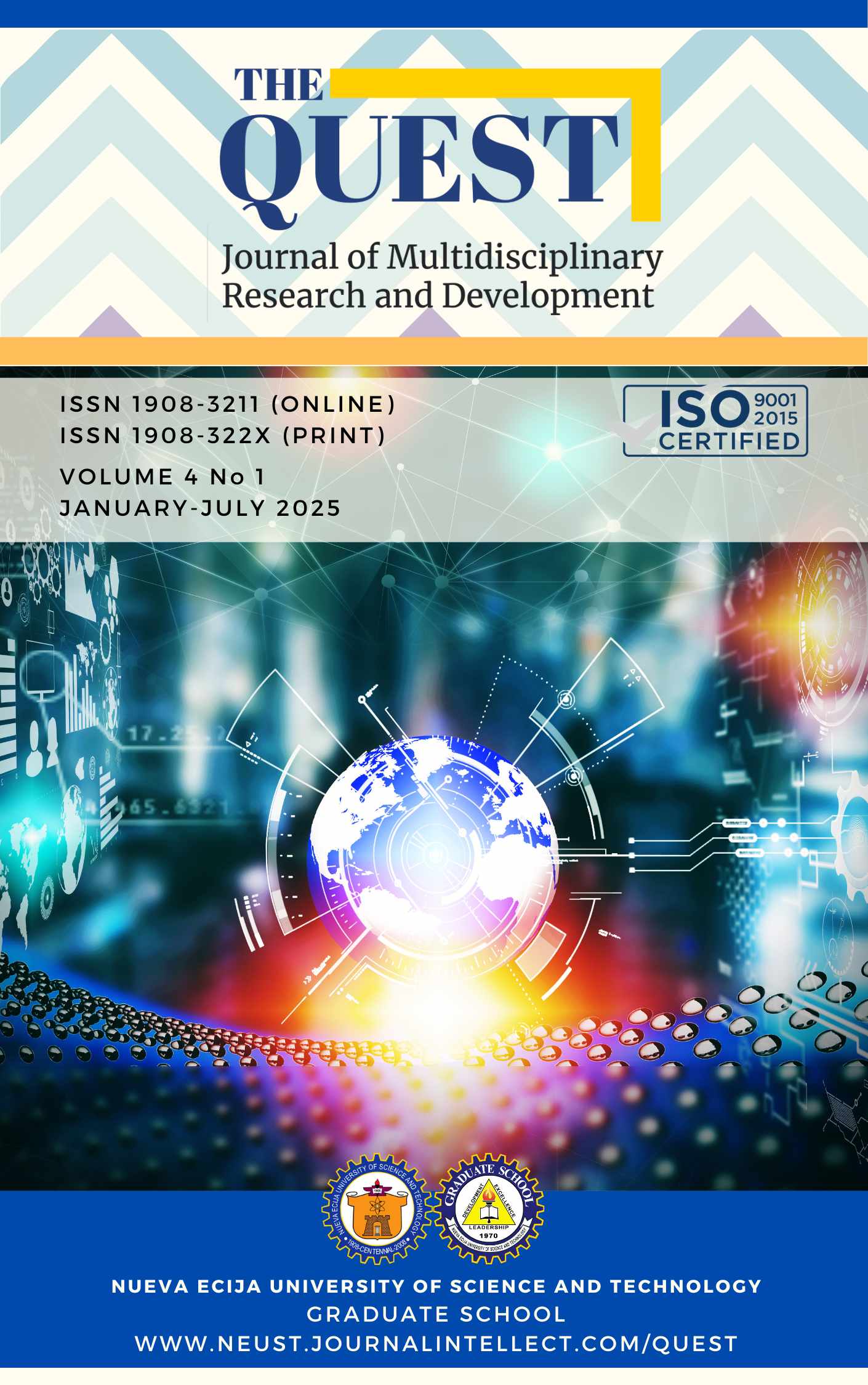Multilingual Web-Based Application to Supplement Language Instruction Among Indigenous Schools in Dingalan, Aurora

Published 07/25/2025
Keywords
- Multilingual,
- Web-based application,
- Indigenous education,
- Language instruction,
- Mother tongue-based
- Dingalan Aurora,
- Educational technology,
- Language translation,
- ICT in education,
- Filipino dialects,
- Bulos language,
- Digital learning tools,
- Modular learning,
- Audio-visual aids,
- Curriculum support ...More
How to Cite
Copyright (c) 2025 The QUEST: Journal of Multidisciplinary Research and Development

This work is licensed under a Creative Commons Attribution-NonCommercial 4.0 International License.
Abstract
This project aims to develop a Multilingual Web-Based Application to support language instruction in indigenous schools in Dingalan, Aurora. Language is not only a tool for communication but also a vessel of culture and identity. However, many indigenous languages in the Philippines—such as Bulos, the native language of some communities in Dingalan—are at risk due to the dominance of Filipino and English in formal education. This creates barriers for indigenous students who struggle to understand lessons in unfamiliar languages, resulting in low comprehension, reduced participation, and cultural disconnection. Teachers also face challenges due to the lack of multilingual teaching resources. To address these issues, the application enables users to translate learning materials—such as activities, quizzes, exams, and modules—into Bulos, Filipino, or English. It also features an audio function that allows users to hear the correct pronunciation of selected words, enhancing both comprehension and oral language skills. This supports inclusive learning, language development, and cultural preservation within the classroom. The system is designed to be accessible on multiple devices, includes offline functionality, and features a user-friendly interface suited for varying levels of digital literacy. These features ensure that both students and teachers, even in remote or underserved areas, can effectively use the application regardless of connectivity or technical familiarity.
Ultimately, this project promotes educational equity, indigenous language revitalization, and cultural continuity. It empowers teachers with practical tools and motivates students to engage in meaningful learning experiences. Most importantly, it aids in preserving the Bulos language by embedding it into a modern educational platform. This initiative serves as a model for integrating indigenous languages into digital learning environments and can inspire similar efforts in other regions of the Philippines.
References
- Anderson, P., & Kim, N. (2023). Web-based learning systems in indigenous schools: A performance-based study. Asian Journal of Educational Development, 10(1), 15–32.
- Brown, A., & Lopez, S. (2021). Digital tools in language preservation for indigenous cultures. Language and Culture Journal, 9(2), 33–49.
- Cruz, N., & Dela Vega, M. (2024). Addressing contextual needs in multilingual education systems. Multilingual Learning Research, 6(3), 88–104.
- Dela Cruz, L., Reyes, M., & Santos, P. (2018). Barriers to successful implementation of MTB-MLE in indigenous schools in the Philippines. Journal of Multilingual Education Studies, 5(2), 45–60.
- Department of Education (DepEd). (2009). DepEd Order No. 74, s. 2009: Institutionalizing mother tongue-based multilingual education (MTB-MLE). Department of Education. https://www.deped.gov.ph/
- Esteban, A. P. (2023). Web engineering and e-commerce: Bridging technology and business in the Philippines. Nueva Ecija University of Science and Technology.
- Esteban, A. P. (2025). Assessing the impact of community extension program in a Philippines state university: A comprehensive framework and analysis. Edelweiss Applied Science and Technology, 9(2), 1659-1675.
- Google. (2025). Dingalan, Aurora, Philippines. Google Maps. https://maps.google.com
- International Organization for Standardization. (2011). ISO/IEC 25010:2011—Systems and software engineering—Systems and software quality requirements and evaluation (SQuaRE). ISO. https://www.iso.org/standard/35733.html
- Johnson, R. A. (2019). Designing gamified indigenous language platforms: A usability case study. International Journal of Language & Technology Integration, 6(1), 22–38.
